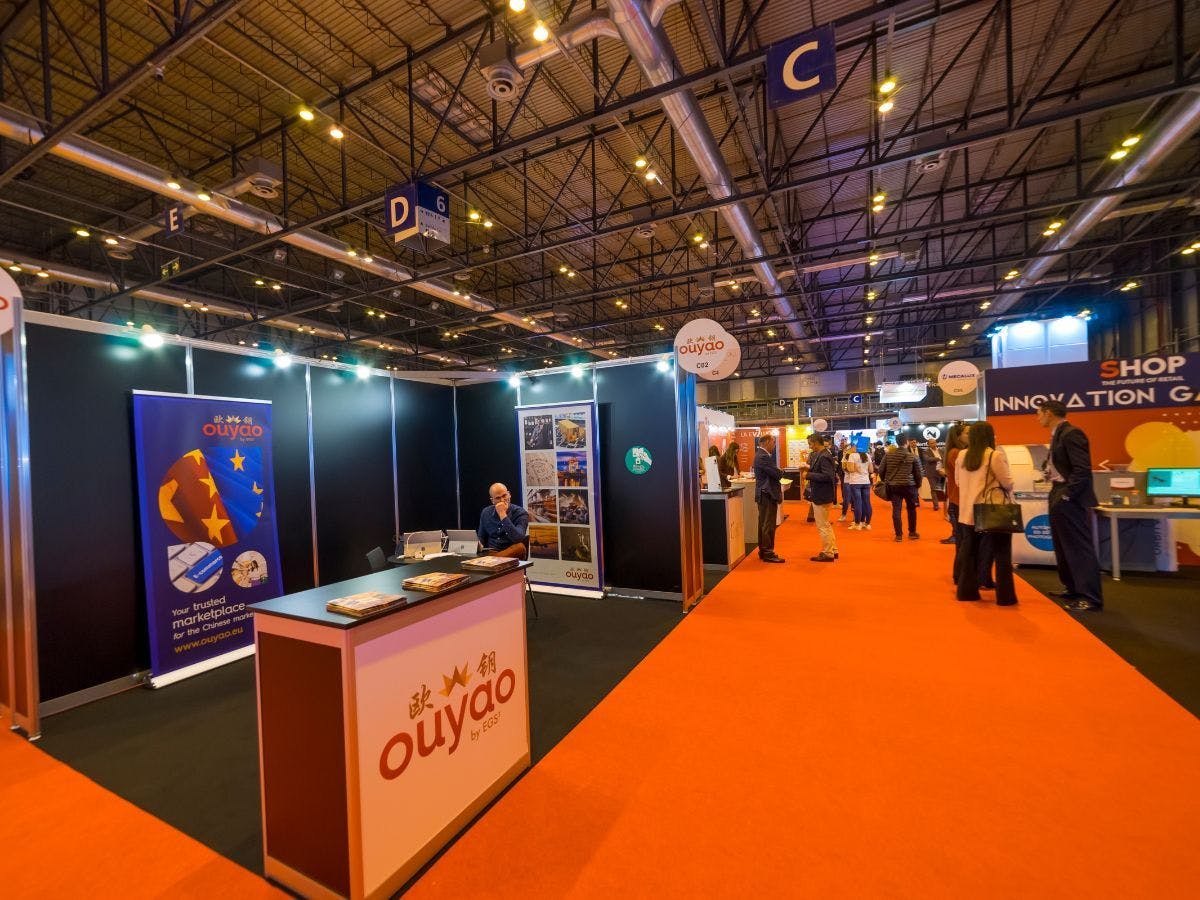- /
- Events/
Unleashing Trade Show Success: A Strategic Guide for Your Business
Welcome, business owner! In this article, we'll delve into the world of trade shows and how they can turbocharge your business growth. Discover the secrets to stand out, make valuable connections, and boost your brand's success. Let's embark on this strategic journey together.
What is a trade show?
So first off, what is a trade show? A trade show is a dynamic business event where companies from a specific industry come together to showcase their products, services, and innovations. It serves as a platform for networking, promoting brands, generating leads, and staying ahead of industry trends. At trade shows, attendees can explore a diverse range of exhibitors, engage in product demonstrations, attend educational sessions, and connect with industry professionals.
It offers a unique opportunity to establish business relationships, collaborate with potential partners, and gain valuable market insights. Trade shows are an essential part of business growth, providing a vibrant environment for companies to make a lasting impression and create meaningful connections within their industry.

The Power of Trade Shows for Your Business
Showcasing Your Products and Services
Trade shows create a platform to captivate your target audience, increase brand visibility, and generate leads and sales. It's an opportunity to showcase your products or services in an immersive and interactive way. Through well-designed booths, engaging displays, and captivating demonstrations, you can leave a lasting impression on attendees and create a buzz around your brand.
Networking
Trade shows provide a unique environment for forging valuable connections with potential clients and industry professionals. It's a chance to engage in meaningful conversations, build relationships, and explore collaboration opportunities. By actively networking at trade shows, you can expand your professional network, gain insights from industry leaders, and form lucrative partnerships that can propel your business forward.
Market Research Advantage
Attending trade shows allows you to gather valuable market insights and gain a competitive edge. You can observe industry trends, analyze competitor offerings, and identify emerging opportunities. Interacting with other exhibitors and attendees can provide valuable market intelligence that can shape your business strategies and help you stay ahead of the curve.

Preparing for Trade Show Triumph
Goal Setting
Before diving into the world of trade shows, it's crucial to define your objectives and set a clear roadmap for success. What do you aim to achieve? Are you looking to generate leads, launch a new product, or increase brand awareness? By setting specific, measurable, attainable, relevant, and time-bound (SMART) goals, you can align your efforts and maximize your trade show experience.
Choosing the Right Trade Show
Selecting the right trade show is essential to ensure you reach your target audience and achieve your goals. Consider factors such as the industry focus, attendee demographics, location, and reputation of the trade show. Thorough research and careful evaluation will help you identify the trade shows that align with your business objectives and provide the best opportunities for success.
Crafting an Irresistible Booth
Designing an eye-catching and memorable booth is crucial to attract attention and stand out from the crowd. Consider your brand identity, messaging, and target audience when creating your booth's visual elements. Incorporate engaging displays, interactive technology, and well-planned signage to create a visually appealing and immersive experience for attendees.
Equipping Your Team
Preparing your team for the trade show is essential to ensure a successful experience. Train your staff to be knowledgeable about your products or services, practice effective communication skills, and develop strategies to engage with potential clients. Encourage them to be enthusiastic, approachable, and well-prepared to deliver impactful product demonstrations and answer attendees' questions.

Strategies to Maximise Trade Show Success
Interactive Experiences
Engaging attendees with interactive experiences can leave a lasting impression and create a buzz around your booth. Consider incorporating virtual reality demonstrations, interactive displays, or engaging games that align with your brand and offerings. These experiences not only attract attention but also provide a memorable and immersive experience that attendees will remember long after the trade show.
Lead Generation and Follow-Up
Collecting and nurturing leads is crucial for converting trade show attendees into valuable clients. Implement effective lead capture strategies, such as offering incentives for attendees to share their contact information or providing interactive touchpoints to gather leads digitally. After the trade show, ensure prompt and personalised follow-up to continue the conversation, nurture relationships, and convert leads into loyal customers.
Digital Marketing Integration
Leverage the power of digital marketing to create buzz before, during, and after the trade show. Utilise social media platforms to build anticipation, engage with attendees, and share real-time updates. Develop targeted email marketing campaigns to communicate with prospects and existing customers. Additionally, consider digital advertising to expand your reach and drive traffic to your booth.
Measuring ROI
Tracking and evaluating the return on investment (ROI) from your trade show participation is crucial to make data-driven decisions for future shows. Define key performance indicators (KPIs) aligned with your goals and use tools like lead tracking systems, surveys, and post-event analysis to measure your success. By analysing the data, you can identify areas of improvement, optimise your strategies, and maximise the value of future trade show investments.

Overcoming Trade Show Challenges
Managing Logistics and Budget
Trade shows can present logistical and budgetary challenges. Create a detailed plan that covers all aspects, including booth design, shipping, travel arrangements, and on-site logistics. Explore cost-effective solutions, such as sharing booth space with complementary businesses or utilizing technology to streamline processes. By careful planning and effective budget management, you can optimize your resources and ensure a smooth trade show experience.
Standing Out from the Crowd
In a competitive trade show environment, it's essential to differentiate your booth and attract maximum attention. Develop creative strategies to captivate attendees, such as offering exclusive promotions, hosting live demonstrations, or organizing engaging activities. Consider incorporating unique visual elements, interactive displays, or captivating signage to create a visually appealing and memorable presence that sets you apart.
Navigating Unexpected Setbacks
Trade shows may come with unexpected setbacks, such as technical issues, weather challenges, or last-minute changes. Prepare for contingencies by having backup plans, contingency budgets, and alternative strategies. Cultivate resilience, adaptability, and professionalism to handle unforeseen obstacles with grace and maintain a positive and memorable presence at the trade show.
Post-Trade Show Success Strategies
Effective Follow-Up
Mastering the art of post-trade show communication is crucial to nurture relationships and convert leads into loyal customers. Develop a follow-up plan that includes personalised emails, phone calls, or meetings with qualified leads. Provide valuable content, exclusive offers, or incentives to keep prospects engaged and build long-lasting relationships. Timely and meaningful follow-up demonstrates your commitment and turns leads into valuable customers.
Evaluating and Refining
Evaluating your trade show performance is vital to gather feedback and make informed adjustments for future participation. Conduct a comprehensive evaluation by reviewing your goals, metrics, and attendee feedback. Identify areas of success and improvement to refine your strategies, booth design, messaging, and lead generation tactics. Continuously learn from each trade show experience to optimise your trade show performance and drive greater success in the future.
Sharing Insights and Empowering Your Team
Harness the knowledge gained from trade shows to inspire and educate your team. Share key insights, best practices, and success stories to foster a culture of continuous improvement. Encourage your team to apply their learnings in their day-to-day activities and empower them to take an active role in future trade show planning and execution. By sharing experiences and knowledge, you can create a unified and motivated team that drives trade show success.
To wrap things up
Congratulations, business owner, on unlocking the immense potential of trade shows! By implementing the strategies outlined in this guide, you're poised to drive business growth, expand your network, and leave an indelible mark in your industry. Embrace the opportunities that trade shows offer and watch your business soar to new heights. Remember, success awaits those who seize it!

FAQs on trade shows
What is the difference between a trade show and an expo?
While the terms "trade show" and "expo" are often used interchangeably, there are some subtle differences between the two. A trade show is typically focused on a specific industry or niche and is primarily geared towards professionals within that industry. It offers a platform for companies to showcase their products, network with potential clients or partners, and stay updated on industry trends. On the other hand, an expo, short for exposition, is generally larger in scale and may cover a broader range of industries or themes. Expos often incorporate a mix of trade shows, exhibitions, and educational events. They are open to the public and aim to provide a comprehensive experience, combining entertainment, information, and commerce.
What is the purpose of a trade show?
The purpose of a trade show is to provide a platform for businesses to showcase their products or services, connect with potential clients or partners, and stay informed about industry trends. It offers an opportunity for companies to generate leads, increase brand visibility, and foster business relationships. By participating in trade shows, businesses aim to enhance their market presence, drive sales, and gain a competitive edge in their industry.
About Victor Chan
Victor Chan is a dedicated researcher in the event planning space, exploring the intricacies of creating memorable experiences. With a focus on innovative strategies and emerging trends, Victor's work contributes to the evolving field of event coordination. He seeks to offer valuable insights and fresh perspectives to enhance the practice of event planning.




